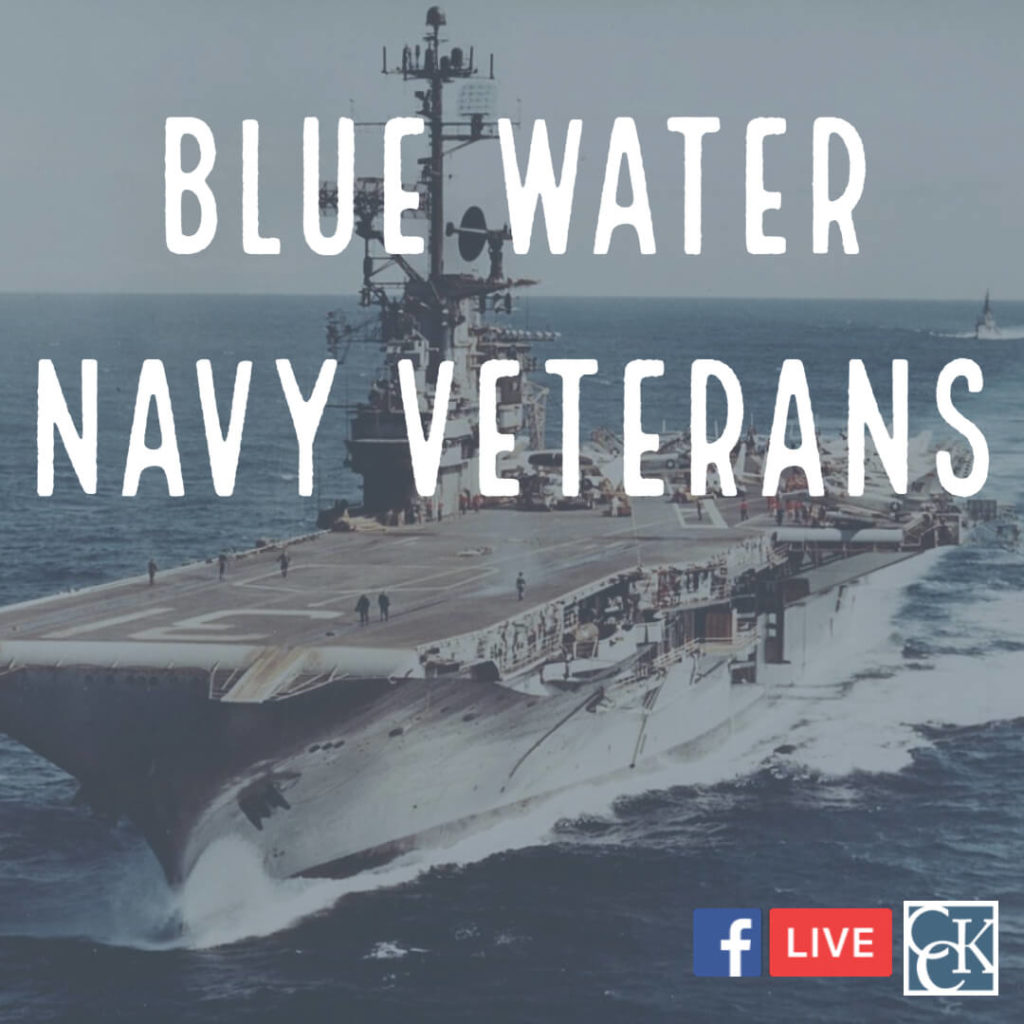CCK LIVE: Blue Water Navy Veterans

CCK Law: Our Vital Role in Veterans Law
Legislation has been introduced to the U.S. House of Representatives to expand access to VA disability benefits under VA’s Agent Orange presumption to Blue Water Navy veterans. The bill would allow Blue Water Navy veterans to claim service connection for Agent Orange-related conditions under VA’s regulation of presumption for Agent Orange exposure.

What Are Blue Water Navy Veterans?
Blue Water Navy veterans are those who served aboard ships in the open waters off the coast of Vietnam during the Vietnam War who did not go ashore to Vietnam. Blue Water Navy veterans include those who did not set foot on the landmass of Vietnam or who never went into the inland water ways of Vietnam, often referred to as “Brown Water” veterans. It is estimated that there are 90,000 Blue Water Navy veterans.
VA’s Agent Orange Presumption
The current Agent Orange presumption requires VA to presume exposure to herbicides for veterans “who, during active military, naval, or air service, served in the Republic of Vietnam during the period beginning on January 9, 1962, and ending on May 7, 1975.” The regulation considers service in the Republic of Vietnam to mean service in the waters offshore and service in other locations if the condition of service involved “duty or visitation in the Republic of Vietnam.”
VA does not consider Blue Water Navy veterans to be eligible for presumptive service connection under this regulation.
Blue Water Navy Vietnam Veterans Act of 2017
The bill introduced to the United States Congress in 2017 is concerned with veterans “who, during active military, naval, or air service, served in the territorial seas of the Republic of Vietnam during the period beginning on January 9, 1962, and ending on May 7, 1975.” It is not clear at this time as to what VA would consider to be the “territorial seas of the Republic of Vietnam.” The bill was originally introduced in January 2017, and was approved by the House Veterans’ Affairs Committee on May 7, 2018. It will now go to the full House of Representatives for a vote.
The bill would expand coverage under VA’s current regulation for presumption of herbicide exposure.
UPDATE: Blue Water Navy Veterans who served offshore within twelve nautical miles from the line of demarcation of Vietnam are now eligible for the same presumption of exposure as Veterans with “boots on the ground” service in Vietnam.
How Would Effective Dates Be Impacted? Would Nehmer Rules Apply?
The bill includes provisions concerning effective dates for claims filed by Blue Water Navy veterans. The bill states that if a veteran filed a claim for compensation between September 25, 1985 and January 1, 2019 for a condition covered by VA’s regulation due to Agent Orange exposure, and then files a new claim after the passage of the bill, then the veteran’s effective date would be that of their first claim.
These provisions would bring Blue Water Navy veterans into the Nehmer class. Nehmer v. U.S. Department of Veterans Affairs is a 1986 class action lawsuit that allowed Vietnam veterans who were previously denied service connection for certain conditions due to Agent Orange exposure to refile their claims, with their effective date being that of their originally denied claim. Under the bill that has been introduced to Congress, Blue Water Navy veterans will be covered by Nehmer class rules.
The bill requires VA to conduct outreach to Blue Water Navy veterans to make them aware of the new regulation.
What Else Is In the Bill?
Korean DMZ
In addition to the Blue Water Navy provisions, the bill includes an expansion of the presumption of herbicide exposure for veterans who served in the Korean Demilitarized Zone (DMZ) starting September 1, 1967 until August 31, 1971. The current regulation includes veterans who served in or near the Korean DMZ between September 1, 1967 and August 31, 1971. VA currently has a presumption for Korean DMZ veterans and the bill would codify VA’s current practice into a statute.
Benefits for Children of Thailand Veterans
The bill also codifies benefits for certain children of veterans who served in Thailand during the Vietnam War. The bill does not create a presumption for Thailand veterans, but does allow the children of Thailand veterans shown to be exposed to herbicides to receive compensation for spina bifida. Spina bifida is a birth defect in which a baby’s spinal cord does not properly develop. Spina bifida was discovered to be an issue in the children of veterans who were exposed to herbicides. Children with spina bifida are able to receive compensation and educational benefits from VA.
Federal Circuit Hears Case on Blue Water Navy Veterans: Procopio v. Wilkie
On May 4, 2018, the United States Court of Appeals for the Federal Circuit heard oral argument in the case Procopio v. Wilkie regarding VA’s Agent Orange presumption and Blue Water Navy veterans. The case could potentially change VA’s interpretation of their Agent Orange presumption to include Blue Water Navy veterans. The Federal Circuit has previously upheld VA’s interpretation of the regulation excluding Blue Water veteran from the presumption, stating that service in Vietnam meant boots-on-the-ground or service in the inland waterways of Vietnam, or Brown Waters.
The major issue in the current case before the Court concerns what “service in the Republic of Vietnam” means as it pertains to VA’s presumption for herbicide exposure. The veteran and his representative argue that service in the territorial seas of Vietnam, meaning 12 nautical miles seaward of the demarcation line, should be considered as service in the Republic of Vietnam.
The case also presents evidence of Agent Orange exposure through the drinking water onboard the ships that served offshore of Vietnam. The Veteran and his representative argue that water contaminated with Agent Orange was processed through water filtration systems onboard the ships, exposing veterans to Agent Orange through the water they drank, cooked with, and bathed in onboard.
About the Author
Share this Post